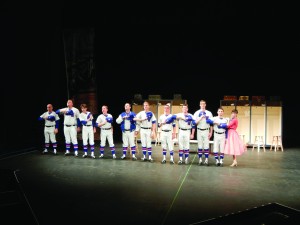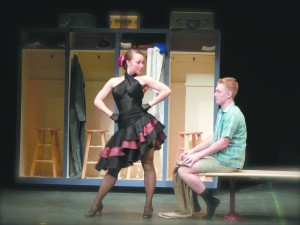
Thunder and lightning strikes. The devil appears; he has come to grant the wish of an elderly baseball fan who sold his soul for the improvement of his favorite team. After minimal negotiation with the devil, the old man is transformed into Joe Hardy, the new star of the Washington Senators.
This was the opening scene for the play “Damn Yankees,” performed by the IU Southeast Theater Department, which ran from Nov. 7 through Nov. 17 in the Robinson Theater, located in the Ogle Center.
Cody King, communications and theater sophomore, played the role of Joe Hardy. King expressed much excitement when explaining the plot of the story.
According to King, his character was a younger version of Joe Boyd, who was a fan of the Washington Senators baseball team. Joe Boyd became frustrated with the team’s losing streak and said he would sell his soul for one long-ball hitter, which is what he believed would make the team better.
“And then the devil shows up, in the form of a salesman—Mr. Applegate,” King said. “He sells his soul to the devil in order to make him young and really talented so he can join the team and make the team good.”
Though King was essentially the main character of the story, he said he did not choose to audition for any specific role. His tryouts consisted of presenting a monologue and song before consideration for the role of Joe Hardy. Afterward, King said he began the process of memorizing lines and getting familiar with his character.
“People will ask ‘how do you remember all of those lines,’” King said. “You just gotta work at it.”
Rosella Loeser, theater junior, played the role of Meg Boyd, the housewife of “Old Joe.” Loeser said she connected with her character by understanding what she wants throughout the production. She said she believed this helped her to become the character, as opposed to just remembering lines and portraying what she thinks her character feels.
“At first I was acting out words and just general emotions,” Loeser said. “Now I’m at the point where I can actually see myself as the character.”
Loeser said she was excited about the solidity of the production, and that the costumes and lighting in the theater brought the play to completion.
She also expressed anticipation for the presence of an audience. Loeser said that rehearsing continuously helped cast members become familiar with the storyline. Therefore, having an audience would reassure the livelihood of the play.
“I’m excited to have an audience there for a feedback of laughter for the jokes,” Loeser said. “It gets to a point where we laughed when seeing it for the first time, but after a while it’s work and we’re focusing on that.”
Natasha Wynn, music freshman, said she really enjoyed the Damn Yankees play—especially how the actors embraced their characters and portrayed them realistically. Wynn said she was also satisfied with the music in the play. She thought the cast did a great job of presenting the musicals.
“Their singing was awesome,” Wynn said.
Wynn said the overall production of the play was respectable. She believed that the scenes were exciting, and some even shocking. Generally, Wynn said that although all of the cast members were talented, Lola was her favorite.
“Lola was my favorite character because she had the most songs in the play,” Wynn said. “She sang well, and I liked her spunky characteristics.”
Students were not alone in having a favorite character; one of the actors, Spencer Korcz, said he favored a particular baseball player most. Korcz, theater junior, said Smokey, who was played by Mitch Donahue, captivated his attention.
“He’s just so funny with everything he does as Smokey,” Korcz said. “He’s so into it, and it’s ridiculously funny.”
Korcz mainly played the owner of the Washington Senators, Mr. Welch. Korcz said Mr. Welch’s relationship with Joe Hardy was important because he ultimately made the decision of welcoming Hardy to the team. Korcz’s character also regulated journalists and reporters that were curious about his abrupt choice.
Though Korcz expressed interest in a particular character, he said he believes each performer contributed to the play equally.







